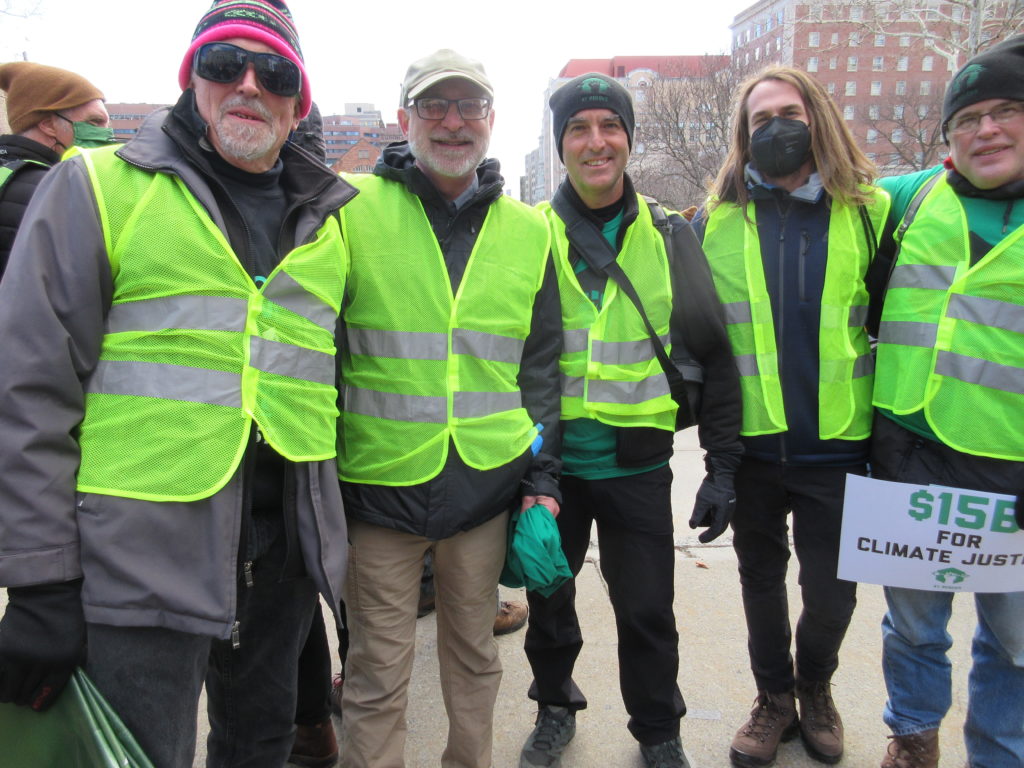Thursday, May 26, 2022 @ 7:00pm
Register here.

A Religious Response to Global Warming
Thursday, May 26, 2022 @ 7:00pm
Register here.
I am Rabbi Glenn Jacob, executive director of New York Interfaith Power & Light, an advocacy group organizing people of faith across the state to fight for climate change legislation. On behalf of 3000 members and 130 congregations across the state, we bring two messages to the Climate Action Council.
We as voters and citizens do not tolerate hypocrisy by those who are elected, are employed by, or volunteer on behalf of the state. Six false solutions have been proposed in the scoping plan that in no manner will address climate change and reduce our carbon footprint in the short number of years we have. Biofuels, “renewable” natural gas, biomass, waste incineration, “green” hydrogen and carbon capture technologies either do not exist or they are still destructive to our environment and communities. Those proposing these solutions are misleading New Yorkers for their own narrow benefit.
Most important, the people of faith across the state want to know if the members of the Climate Action Council are going to act with moral courage or succumb to moral cowardice. The only possible solution is reducing the carbon footprint as thoroughly as possible and as soon as possible. Adherence to the CLCPA mandate is the only viable choice, funding its mandate as written, fully. Any other solution is an abdication of your moral obligations to the state, its citizens and to be honest, your families. Are you going to acquiesce to greed and power, or are you going to fight to save the creation?
Let me remind you: We are the first generation to address climate change and we are the last one that can. Thank you.

NYSERDA, New York State Energy Research and Development Authority has released its strategic plan for the next three years. We fought to pass the legislation in 2019 that governs where this plan seeks to go. As we continue to fight to fund the 2019 mandate (the CLCPA), this document maps out how the state energy bureaucracy sees the state moving forward.

The crime that environmental justice addresses is a challenge to wholly grasp. Carelessly discarding toxic waste that will kill and maim people is a true but misleading definition. Sometimes the perpetrators are not careless or arbitrary. Sometimes the polluters pretend that consequences do not exist, even to the point of creating media campaigns to bolster their claims. Remember clean coal? When the people of the Biblical era began to identify and address the need for justice, they had an inkling of the human potential to kill myriads, but no context of how far some humans are willing to go.
The term “environmental justice” is complex as well, easy to understand from a surface reading yet complicated once one delves into the subject. The fact to know is the highest carbon producing and toxic generating facilities and factories are deliberately located in black and brown communities. Indigenous communities are not far behind. Factories close and the owners take no responsibility for the lethal consequences they leave behind because they took no responsibility while the factories ran.
Environmental justice is endemic, having been with us since the origins of the industrial revolution. Cleaning up one’s industrial messes were never mandated, or the mandates were rendered toothless. The common false claims such as “paying for it will cost jobs” or “we’ll go bankrupt, and no one will have a job” or “we gave them a community (jobs); they should take some responsibility” highlight how deeply buried in the fabric of the economy and the culture the supposed “right to pollute” runs.
The environmental cost of doing business is hardly ever, if ever, factored into corporate business plans. The cost of carbon and environmental pollutions is not included as a debit line in accounting spreadsheets.* A tech company can claim they are “carbon neutral,” but not only did they build that way to save money, they ignored the other environmental degradations they precipitated. The city, the county, the state, or sometimes even the federal government are left with the poisonous consequences. Corporations takes their profits and leave the taxpayers with the environmental costs, which run into the billions, if not the trillions now.
We must convert to a clean renewable energy economy, which will run into trillions of dollars. Where are the additional trillions of dollars to clean up the toxic waste we have now going to come from? From where will the additional money come from to pay for the asthma, the cancers, and the other circulatory and respiratory illnesses caused by these known toxins already present in neighborhoods in every state?
You want to do justice? Then, get angry. Start asking questions. Challenge zoning boards. Demand municipal and county leaders address environmental consequences. Teach your friends and your neighbors. Force the issue into the local news. Preach it.
You want to do justice, which makes you a descendent of the prophets. Taking up the yoke of the commandments is not an easy task, but in every generation, believers have harkened to the call.
There are two ways to view the United Nations’ COP26 convocation in Glasgow that ended this past weekend. Either COP26 was a complete failure for the planet and a win for the fossil fuel industries, or COP26 accomplished part of its mission to highlight how far we have come in ten years and what we must do in the next ten years. An element of truth may be found in both views.
The typical method for evaluating laws and initiatives on climate change hinges on three criteria. The first is a baseline of cutting carbon emissions by 50% by 2030. The second is stopping or substantially reducing government subsidies to fossil fuel industries. The last criterion is a carbon tax or carbon-producer penalties that curb carbon producing behaviors. COP26 did not produce any policies that address any of these three criteria.
Therefore COP26 was a complete failure.
Except, the United Nations and the United Nations Framework Convention on Climate Change (UNFCCC) has no authority to enforce anything in any agreement. In the Paris Agreement, UNFCCC was tasked with structuring and publicizing voluntary national goals and commitments. The original COP agreement cannot make any country or corporation do anything.
This lack of authority and weakened encouragement to act is what Greta Thunberg was referring to when she condemned the prodigious diplomatic production of empty sentiments and weak commitments as “blah, blah, blah.” The negotiations were mostly between white men over the age of sixty years who arrived at the conference on private or chartered jets. The last point to the sense of failure is more lobbyists for the fossil fuels industries attended than diplomats.
The final agreement in Glasgow is hollow and dependent on the voluntary cooperation of governments and corporations – just as it was envisioned in the Paris Agreement. The Paris Agreement, even with its voluntary mandate, is working though. Ten years ago, the world was well on its way to a 4oC – 6oC rise in ambient temperature by 2100. At Glasgow, the scientists announced we have bent the curve downward to 2.7oC. No one will argue we have saved the planet from climate change yet, but the trajectory is in the correct direction. Despite the billions of dollars spent in the past ten years by the fossil fuel industry to defeat renewable energy and climate change legislation, we are still accomplishing systemic change.
Towards this incremental trend downwards, a global treaty on methane was brokered by the USA and UK, which was signed by more than 100 countries. A 24/7 Carbon-free Energy Compact was formed that cemented the partnership between renewable energy companies with Sustainable Energy for All and UN Energy. Over 100 companies pledged to stop deforestation by 2030, which is weak because the Amazon Basin could be entirely deforested before then. Organizations and governments pledged $10.5 billion towards helping emerging economies transition from fossil fuels. No more financing is allowed for international fossil fuel projects. Public financing for overseas coal projects is ending.
As the last ten years have shown and Glasgow confirmed, national governments are going to be the cars at the back of the train. NGO’s, renewable energy companies, scientists, engineers, non-national governments (state and local), and climate activists are driving the train.
We bid goodbye to the utterly dismal threat of complete extinction of the planet and life. Though tentative and not at full strength, we celebrate the successes at turning the tide and reversing the global warming trend. Although we are not close to our goal, we have made great strides that should give us hope and renew our strength to continue the legislative and regulatory battles that loom.
Yes, when community organizers declare “you are the change,” Glasgow COP 26 confirms it. As a fellow citizen of the planet, thank you.
For a deep dive into the statements made above, go to https://climateactiontracker.org/publications/glasgows-2030-credibility-gap-net-zeros-lip-service-to-climate-action/
When Vice News interviewed the mayor of an Oregon town who lost a third of its housing to last year’s wildfires, the mayor offered the following sentiment. She was asked if encouraging people to return was a good idea with the ongoing threat of another wildfire. Her response was that climate change is everywhere and this is where they were choosing to make a stand.
Her statement struck me as odd. While her determination was admirable, her plan seemed misplaced as was the municipal money she had allocated. They were building Recreational Vehicle (RV) hookups to help displaced residents who could not afford to rebuild to return to town. Approving expenditures to help people return sounds worthwhile and a proper function of government at first glance. However, in a time of escalating climate change, the proper first priority of government is not accommodating people. The priority must be creating a survivable environment, a concept that only specialized segments of government bureaucracies who use emergency management centers typically encounter. A climate-stricken world requires an entire revamping of the role of government. The new reality is climate change is an ongoing crisis.
The climate change crisis in Oregon may be wildfires while the coastal flooding is the ongoing destruction in Miami, Florida. California and the rest of the southwestern United States are suffering prolonged droughts. Parts of Germany and Belgium are inundated with swollen rivers while the Indian subcontinent faces the extremes of misplaced monsoons.
Certain religious traditions have more to say about long ongoing crises than others. Diaspora religions living among other majorities have long understood that there is no instant or elegant solution to resolving a long enduring crisis. Success is not characterized as overcoming or winning, instead success is defined as creating a dynamic balance that adjusts as the surges of tension and confrontation roil.
Most holy scriptures are a chronicle of the crises in the lives of human beings and their nations.[i] The religious voice offers powerful methodologies for navigating the effects of climate change and countering the greedy interests that want us to ignore climate change. Contrary to the sneering condescension of critics, the proffered methods are not ‘let us pray on it.’ Seeking common ground, aligning communal interests, raising and promoting volunteers, redirecting self-interest, and confirming universal ideals that can inspire all are some of the religious lessons that people of faith still use today. Multi-religious initiatives for the community’s good inspire and work.
Religions work in a specific manner in the public sphere. They offer established principles that set priorities of action and promulgate rules that define boundaries of acceptable actions. Saving lives is always the highest priority because life is sacred. Preventing the circumstances that threaten life is the next priority because it leads to the highest priority. In contrast, politicians talk about saving money and saving jobs as the highest priorities. The religious models accept those political talking points, but place them within the context of saving lives, putting jobs and money in a healthier and more achievable context.
When my new county executive was elected, I met him at a gala fundraising for another organization. After congratulations and introductions, he asked what was on my mind.
“Asphalt,†I said.
“Come again?â€
I continued. “You inherited a budget from your predecessor with a funding structure of replacing roads after twenty years of use. The extremes of climate change in our county have probably reduced the lifespan of our roads by five years, give or take. Did you know this was happening?â€
“Let me look into that,†he said.
The upshot of that conversation was an aggressive tarring campaign, where a crew walks every road with a hot tar machine in tow, filling in every crack in the asphalt with tar. The process gives the road another two to three years of life. The tarring program had disappeared in the rush to cut government spending in previous administrations. The tar is inexpensive, but the crew time is costly – not as costly as putting in new roads though. The county executive’s response is an example of the dynamic flexibility required to address the facts of climate change. The politician’s priority of money and jobs was preserved and my priority of preventing destructive circumstances was achieved.
(A quick aside, the asphalt example can be correctly categorized as an example of adaptation. Adapting to climate change is a necessary step that many in the environmental advocacy arena dismiss as a distraction from the goal of clean renewable energy legislation or worse, a surrender to the failure of ridding the world of carbon producing fossil fuels. The events of the past few years have clarified that adaptation will be a necessary component of any climate change legislation, an unfortunate but predictable development. Most politicians are amenable to adaptation spending in their districts.)
While my county executive is an elected position, he used the bureaucracy to address the effects of climate change. The public rhetoric to address carbon pollution often overlooks the power of the bureaucracy. Bureaucracies are slow, rigid, and cranky; they are depicted as prone to corruption with political appointments and highjacked bids. The crimes reach the news cycles, but the day-to-day work, plodding up and down the streets for instance, are beneath notice. Bureaucracies do work and they can be quite powerful.
The dynamic power of a federal bureaucracy can have global reach, addressing not just the effects but the sources of carbon pollution. Reuters reported on August 16th, 2021, that the “U.S. Treasury to oppose development bank financing for most fossil fuel projects.†Fossil Fuel companies can longer use the multilateral development banks across the world to fund their projects. The only exceptions are countries buying coal plants to shut them down and poor countries with no infrastructure purchasing some natural gas-powered generation downstream. Using the bureaucracy, the U.S. government has shut down an “at the source†funding stream for the fossil fuel industry. The U.S. Treasury is using its leverage in a new manner to shut down new fossil fuel development across the globe. While the U.S. Treasury has offered “guidance†throughout its history, this is a climate first and a welcome one.
Addressing climate change is not about a stand against the effects of climate change. All the industries that oppose addressing climate change are happy with this misguided stance and encourage it. The more effort that is expended on the destruction and costs produced by climate change, the less effort is available to attack the sources of climate change. The mayor in Oregon is truly looking out for her citizens and the town, for which she deserves our compliments and encouragement. People who use their political power to raise the downtrodden and stricken deserve the support of religious affirmation. However, when the means of support are misdirected, more productive actions need to be introduced and corrected if possible.
As we examine the laws, regulations, and allocations in our local communities, we must keep the following mantra in mind: We cannot fight climate change; we can only fight the sources of climate change.
[i] Following Judah Magnes PhD, Gleanings 1948
The Exxon-Mobil corporation relies on eleven senators to silence attacks on the fossil fuel industry and to defeat legislation that would hurt their business. They particularly detest the Carbon Tax proposals, which are necessary to convert the economy to a renewal energy economy. Under the rubric of Citizens United, the purchase of U.S. senators by donation and unspecified support is legal. The eleven senators who are considered “owned” by Exxon-Mobil company executives are:

1. Joe Manchin -D
2. John Barrasso -R
3. John Cornyn -R
4. Steve Daines -R
5. Shelly Moore Capito -R
6. Marco Rubio -R
7. Chris Coons -D
8. Maggie Hassan -D
9. Mark Kelly -D
10. Kyrsten Sinema -D
11. Jon Tester -D